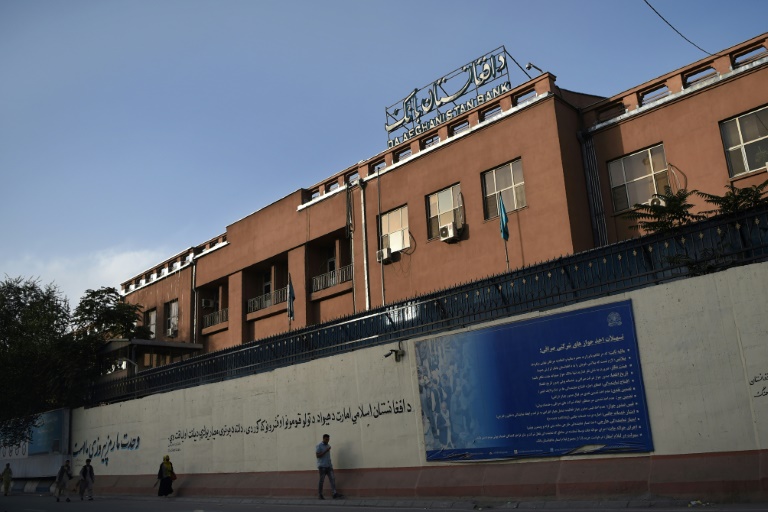US sets up fund for Afghan money after Taliban talks flop

Kabul residents walk in October 2021 past the central Da Afghanistan Bank, which the United States has decided to sideline in administering the country’s reserves following the Taliban takeover
Washington – The United States said Wednesday it was setting up an outside, professionally-run fund to manage $3.5 billion in Afghanistan’s reserves, concluding it cannot trust the Taliban leadership with the country’s money.
The new Afghan Fund, based in Geneva, will be put in charge of core central bank functions such as paying Afghanistan’s international arrears and for its electricity imports and potentially for future necessities such as printing currency.
The decision comes after talks between the Taliban and the United States failed to convince President Joe Biden’s administration that it should hand over assets frozen when the Islamist militants returned to power 13 months ago, despite the dire humanitarian needs in Afghanistan.
In a letter to Afghanistan’s central bank, US Deputy Treasury Secretary Wally Adeyemo voiced regret that it had not addressed US concerns including demonstrating independence from the Taliban, enforcing pre-Taliban commitments against counter-terrorism funding and money laundering, and bringing in a reputable outside monitor.
“There is currently no institution in Afghanistan that can guarantee that these funds would be used only for the benefit of the people of Afghanistan, including DAB,” he wrote, using the acronym of the central Da Afghanistan Bank.
“Until these conditions are met, sending assets to DAB would place them at unacceptable risk and jeopardize them as a source of support for the Afghan people,” he wrote in a letter obtained by AFP.
The Afghan Fund will be incorporated in Switzerland with a board of two appointed Afghan economists unaffiliated with the Taliban and representatives of both the US and Swiss governments.
It will maintain an account with the Bank for International Settlements, which is owned by the world’s central banks, and also pay for key functions such as Afghanistan’s access to the global SWIFT banking payment system.
The United States expects the bulk of the reserves to be preserved and “responsibly managed” until the situation changes, a senior official said.
– Dim US view of Taliban –
The United States froze $7 billion in Afghan assets maintained in New York in August 2021 when the two-decade-old Western-backed government swiftly collapsed with Biden’s pullout of US troops.
Biden in February said that half of the assets would be made available to victims of the September 11, 2001 attacks, which prompted the US invasion of Afghanistan that toppled the Taliban, who had given sanctuary to Al-Qaeda.
The decision outraged the Taliban but the militants later opened talks with the United States on a way forward, with momentum building after Afghanistan suffered a devastating earthquake in June.
Then in August, the United States killed Al-Qaeda’s leader Ayman al-Zawahiri in a strike on his home in Kabul. Secretary of State Antony Blinken declared that the Taliban had violated promises to reject terrorism made during a deal with former president Donald Trump to withdraw US troops.
The new fund will not go to assistance. In a statement, Deputy Secretary of State Wendy Sherman said that the United States has contributed $814 million in humanitarian aid since the Taliban takeover, channeled through international agencies and aid groups and not given to the Taliban.
The Afghan Fund will help “reduce suffering and improve economic stability for the people of Afghanistan while continuing to hold the Taliban accountable,” Sherman said.
A World Bank survey conducted late last year found that 70 percent of Afghans said they cannot cover their basic needs including food, up from 35 percent who said so shortly before the Taliban takeover.
A senior US official, speaking on condition of anonymity, said the administration concluded that increasing liquidity in the central bank would not improve the humanitarian situation.
The official said that the United States was still open to “pragmatic engagement” with the Taliban, including on the central bank.
Another $2 billion in Afghan assets have been blocked by Britain, Germany and the United Arab Emirates. Another US official said the other nations could also send the Afghan reserves to the new fund.
